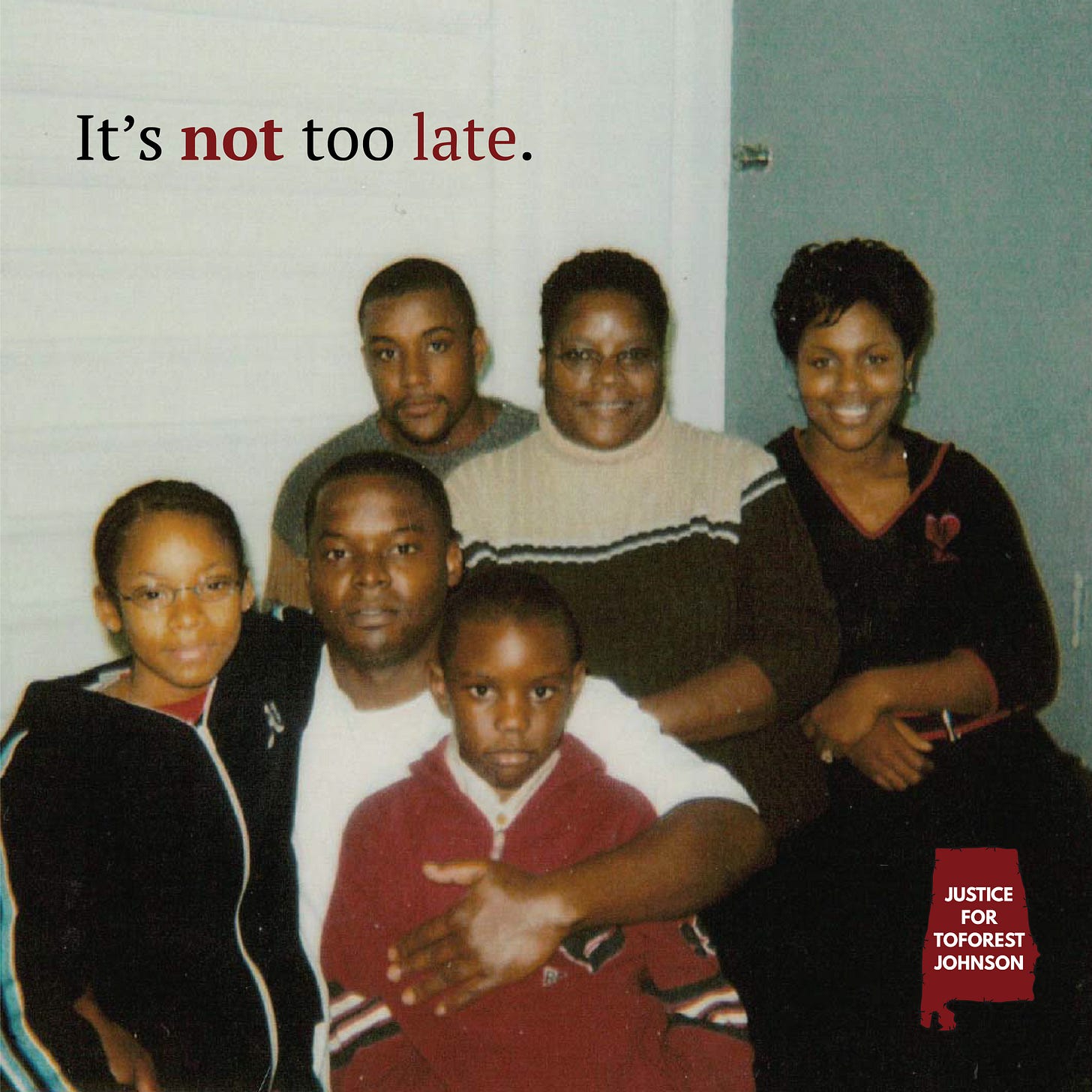Former Juror Agrees That Obviously Innocent Toforest Johnson Is Obviously Innocent
Get this man off death row!
Very frequently, when you see people discussing sexual assault cases online (somehow it’s only ever sexual assault cases), there will always be one person saying that you just simply cannot believe they did it or not until they are officially found guilty in a court of law. I’ve always found this odd, given that juries are made up of human beings who are giving their opinion and who, often, are given even less information to go on than we are. They’re not magic. We know that the guilty often go free — as they should if the prosecution cannot prove its case beyond a reasonable doubt — and we certainly know that a lot of innocent people do not. Often because people replace “beyond a reasonable doubt” with their own “gut feeling,” combined with guilt over how terrible they would feel if the person got off and went and hurt someone else.
But that can lead to another kind of guilty feeling. When it turns out that the person one voted to convict is actually innocent. And it’s certainly worse when that person is on death row.
In fact, one of the primary reasons I oppose the death penalty is because I think it is a terrible burden to place on people, to make them responsible for the death of another human being.
In 1998, Monique Hicks was on the jury that found Toforest Johnson guilty of killing Jefferson County, Alabama, Sheriff’s Deputy William G. Hardy. This week, she wrote an op-ed on AL.com, saying that she regrets her vote, believes he is innocent, and wishes to see him freed from prison entirely.
If you’re not familiar with the case, I assure you that this is not even close to a situation where “Oh, maybe he didn’t do it.” There is almost no question that he didn’t do it. There is no physical evidence, no witnesses, and the only “witness” prosecutors had was a woman — who had testified as the state’s witness in multiple other trials — whom they paid $5,000 to testify that she overheard him confess on a three-way call. This was not revealed until decades later when prosecutors found paperwork they said had been misfiled.
There were, however, multiple witnesses putting him across town at the time the murder occurred.
Hicks writes:
After the trial, I went home and returned to my daily life. I did not hear about Toforest Johnson again for more than two decades. But then I started seeing his case on the news. The Republican former Chief Justice and the former state Attorney General are calling for a new trial. Celebrities like Kim Kardashian are calling for a new trial. Even the District Attorney in Birmingham has called for a new trial.
But one name jumped out at me from the chorus of people asking the court to give this case another look: Jeff Wallace. Yes — the very same prosecutor who stood in front of the jury, looked us in the eyes, and told us Toforest Johnson was guilty and deserved to die. He has publicly called for a new trial. He has said that if he had the power to order a new trial, he would do it today.
Practically everyone involved with this case now agrees that Toforest Johnson was innocent. If you’ve listened to the Earwitness podcast about the trial, you probably do as well (if you haven’t, I highly recommend it). If the state were to grant him a new trial, they would not have any evidence whatsoever with which to convict him, and that seems like a pretty good sign that he should not be in prison.
But Mr. Johnson remains on death row. Alabama is still planning to execute him. How can this be? And what responsibility do I bear? My role in the wrongful conviction of an innocent man keeps me awake at night.
Now, I will say: I really don’t know how Hicks or anyone felt comfortable convicting someone and sentencing them to death based on the testimony of one person who didn’t even see them do anything. I don’t see how that can get you anywhere near “beyond a reasonable doubt.” I find it confusing that Hicks says she and the other jurors were not aware that there was no physical evidence, because one would assume that if there were it would have been presented at trial.
I have always thought, and still believe, that our justice system is supposed to bring closure, but here it seems as though the tragedy only continues to grow. My heart aches thinking of the things I did not know when I was a juror. There was no physical evidence against Mr. Johnson and no eyewitnesses claimed to see him at the scene of the crime. I joined the other jury members in voting to convict based on the testimony of one witness, a woman who claimed that she overheard him confess to the crime during a three-way-call that she eavesdropped on. Our decision relied so heavily on this witness’s credibility, but now I know something critical was hidden from Mr. Johnson’s legal team for nearly 20 years: this witness was paid $5,000 for her testimony. It turns out that she was the state’s witness in many other cases as well, and we never knew about it.
But, in the words of Oleta Adams, “I don’t care how you get here, get here if you can.” The more people we have pushing to release wrongly convicted prisoners like Toforest Johnson, the better, and it’s certainly more convincing when it’s a juror from the actual trial than, well, when it’s me.
State-sponsored killing like this doesn’t just hurt and impact the person condemned and their family members. It’s a cancer that takes something away from everyone involved. It makes regular, everyday people, plucked from a random pool, responsible for the death of another person, which is itself a cruelty. This is especially so when it becomes apparent that the person they sentenced to death is innocent.
Sure, the Supreme Court does not believe that “actual innocence” is any reason to let people off of death row or not execute them, but there is something very, very wrong with a system in which we just shrug our shoulders and say “Welp, nothing we can do here, guess we have to kill this guy!”
PREVIOUSLY:







“A curse on the judges, the coppers and screws
Who tortured the innocent, wrongly accused
For the price of promotion
And justice to sell
May the judged be their judges when they rot down in hell” — Shane MacGowan
OT: You're on your own, old man...
𝗧𝗿𝘂𝗺𝗽 𝗹𝗼𝗼𝗸𝘀 𝘁𝗼 𝗰𝗮𝘀𝘁 '𝗽𝗼𝗼𝗿 𝘁𝘂𝗿𝗻𝗼𝘂𝘁' 𝗼𝗳 𝗵𝘂𝘀𝗵 𝗺𝗼𝗻𝗲𝘆 𝗰𝗿𝗼𝘄𝗱 '𝗮𝘀 𝗺𝗼𝗿𝗲 𝗲𝘃𝗶𝗱𝗲𝗻𝗰𝗲 𝗼𝗳 𝗮 𝗽𝗹𝗼𝘁 𝗮𝗴𝗮𝗶𝗻𝘀𝘁 𝗵𝗶𝗺'
https://www.alternet.org/trump-biden-protesters-trial/